习惯上只接动名词作宾语的动词
动词后接动词不定式/动名词作宾语用法小结
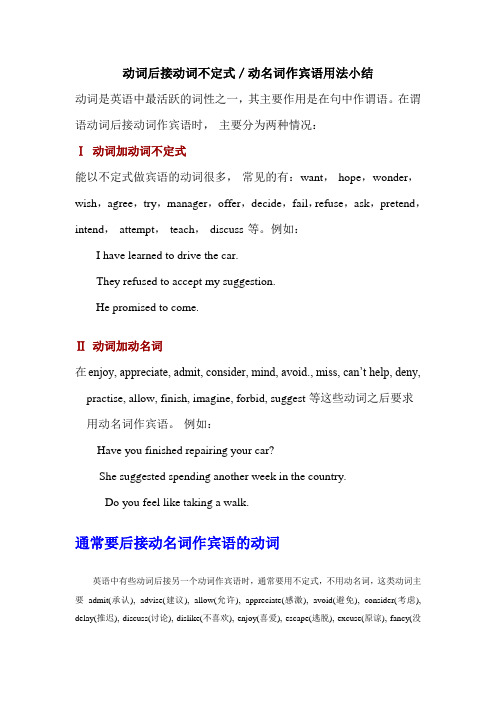
动词后接动词不定式/动名词作宾语用法小结动词是英语中最活跃的词性之一,其主要作用是在句中作谓语。
在谓语动词后接动词作宾语时,主要分为两种情况:Ⅰ动词加动词不定式能以不定式做宾语的动词很多,常见的有:want,hope,wonder,wish,agree,try,manager,offer,decide,fail,refuse,ask,pretend,intend,attempt,teach,discuss等。
例如:I have learned to drive the car.They refused to accept my suggestion.He promised to come.Ⅱ动词加动名词在enjoy, appreciate, admit, consider, mind, avoid., miss, can’t help, deny, practise, allow, finish, imagine, forbid, suggest等这些动词之后要求用动名词作宾语。
例如:Have you finished repairing your car?She suggested spending another week in the country.Do you feel like taking a walk.通常要后接动名词作宾语的动词英语中有些动词后接另一个动词作宾语时,通常要用不定式,不用动名词,这类动词主要admit(承认), advise(建议), allow(允许), appreciate(感激), avoid(避免), consider(考虑), delay(推迟), discuss(讨论), dislike(不喜欢), enjoy(喜爱), escape(逃脱), excuse(原谅), fancy(没想到), finish(完成), forbid(禁止), forgive(原谅), give up(放弃), imagine(想像), keep(保持), mention(提及), mind(介意), miss(没赶上), pardon(原谅), permit(允许), practise(练习), prevent(阻止), put off(推迟), report(报告), resist(忍住), risk(冒险), stop(停止), suggest(建议), understand(理解)等。
动词不定式和动名词作主语和宾语的用法
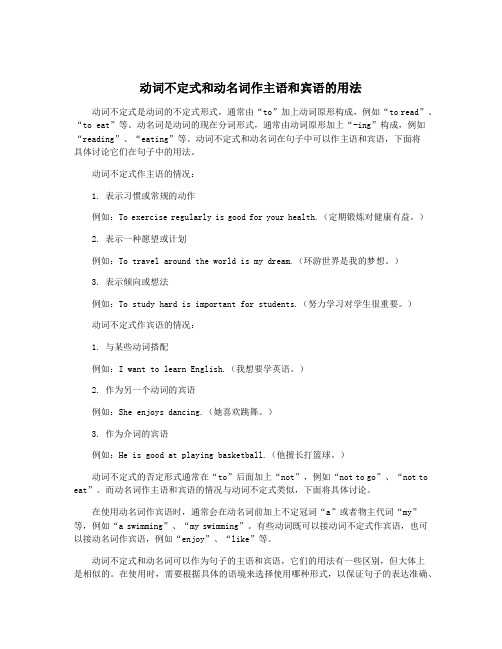
动词不定式和动名词作主语和宾语的用法动词不定式是动词的不定式形式,通常由“to”加上动词原形构成,例如“to read”、“to eat”等。
动名词是动词的现在分词形式,通常由动词原形加上“-ing”构成,例如“reading”、“eating”等。
动词不定式和动名词在句子中可以作主语和宾语,下面将具体讨论它们在句子中的用法。
动词不定式作主语的情况:1. 表示习惯或常规的动作例如:To exercise regularly is good for your health.(定期锻炼对健康有益。
)2. 表示一种愿望或计划例如:To travel around the world is my dream.(环游世界是我的梦想。
)3. 表示倾向或想法例如:To study hard is important for students.(努力学习对学生很重要。
)动词不定式作宾语的情况:1. 与某些动词搭配例如:I want to learn English.(我想要学英语。
)2. 作为另一个动词的宾语例如:She enjoys dancing.(她喜欢跳舞。
)3. 作为介词的宾语例如:He is good at playing basketball.(他擅长打篮球。
)动词不定式的否定形式通常在“to”后面加上“not”,例如“not to go”、“not to eat”。
而动名词作主语和宾语的情况与动词不定式类似,下面将具体讨论。
在使用动名词作宾语时,通常会在动名词前加上不定冠词“a”或者物主代词“my”等,例如“a swimming”、“my swimming”。
有些动词既可以接动词不定式作宾语,也可以接动名词作宾语,例如“enjoy”、“like”等。
动词不定式和动名词可以作为句子的主语和宾语,它们的用法有一些区别,但大体上是相似的。
在使用时,需要根据具体的语境来选择使用哪种形式,以保证句子的表达准确、清晰。
常用来接动名词做宾语的动词

常用来接动名词做宾语的动词哪些动词或短语接动名词是测试中的重点。
往往可分以下两种,现总结如下:①下列动词后常常只能接动名词作宾语:acknowledge承认,自认;advise建议;admit 承认;allow;avoid避免;appreciate感激;bar禁止;cease 停止;consider考虑;confess坦白;delay 延期;deny否认,抵赖;dislike不喜欢,讨厌;enjoy喜欢; escape逃跑;excuse 宽恕;fancy幻想,爱好, imagine想象;include包括、包含;finish完成; complete 完成;forbid禁止;forgive宽恕;imagine想象;mention提到;mind介意、反对; miss错过,想念;keep保持;pardon; 宽恕,原谅practise练习;permit 许可;risk冒险;resist忍住、不屈服于;suggest提议;postpone=put off 延期,推迟;understand理解;favour造成,偏爱; involve卷入,产生某种必然的结果;recall回想;resume恢复;quit放弃、停止;report报告; tolerate 忍受,容忍; hinder耽搁、妨碍;resume继续、重新开始;recommend建议、劝告;等等。
例如:1.In some countries people favor staying together even though there is much more space.在一些国家,尽管有很多空地,人们还是愿意住在一起。
2.With apples at 25 cents a pound, we couldn't resist taking four pounds.由于苹果25分一磅,我们禁不住买了四磅。
3.My mother dislikes seeing you with me. =My mother dislikes our being together.我母亲不喜欢看到你我在一起。
非谓语动词作宾语知识点
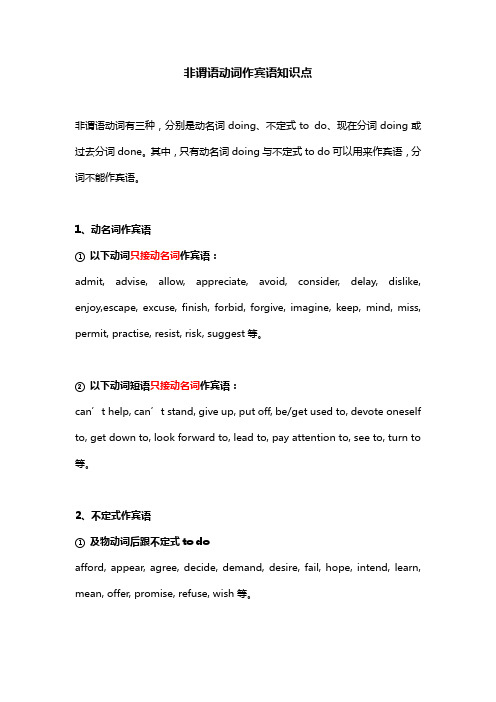
非谓语动词作宾语知识点非谓语动词有三种,分别是动名词doing、不定式to do、现在分词doing或过去分词done。
其中,只有动名词doing与不定式to do可以用来作宾语,分词不能作宾语。
1、动名词作宾语①以下动词只接动名词作宾语:admit, advise, allow, appreciate, avoid, consider, delay, dislike, enjoy,escape, excuse, finish, forbid, forgive, imagine, keep, mind, miss, permit, practise, resist, risk, suggest等。
②以下动词短语只接动名词作宾语:can’t help, can’t stand, give up, put off, be/get used to, devote oneself to, get down to, look forward to, lead to, pay attention to, see to, turn to 等。
2、不定式作宾语①及物动词后跟不定式to doafford, appear, agree, decide, demand, desire, fail, hope, intend, learn, mean, offer, promise, refuse, wish等。
②动词+疑问代(副)词+不定式to do动词:advise, decide, forget, know, learn, remember, see, tell, think, teach, wonder, discover, understand, guess, explain等。
疑问词:what, when, which, where, how,whether。
e.g. He will tell you how to deal with it.特别说明:不定式作宾语时,有时会使用it作形式宾语,然后把不定式放后面。
不定式省略to的10种情况
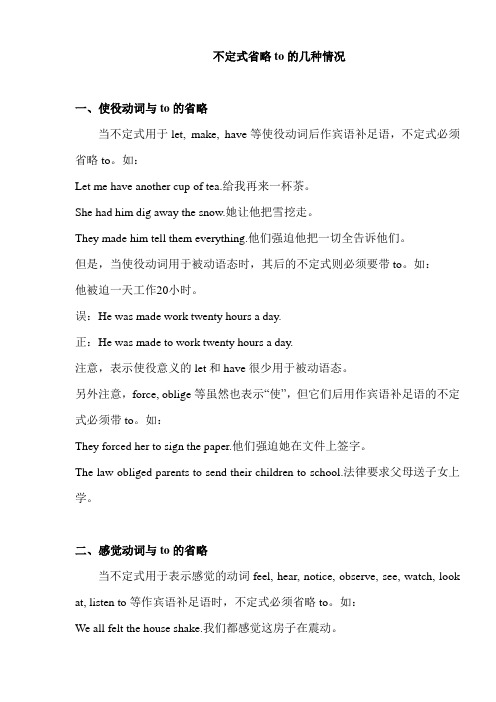
不定式省略to的几种情况一、使役动词与to的省略当不定式用于let, make, have等使役动词后作宾语补足语,不定式必须省略to。
如:Let me have another cup of tea.给我再来一杯茶。
She had him dig away the snow.她让他把雪挖走。
They made him tell them everything.他们强迫他把一切全告诉他们。
但是,当使役动词用于被动语态时,其后的不定式则必须要带to。
如:他被迫一天工作20小时。
误:He was made work twenty hours a day.正:He was made to work twenty hours a day.注意,表示使役意义的let和have很少用于被动语态。
另外注意,force, oblige等虽然也表示“使”,但它们后用作宾语补足语的不定式必须带to。
如:They forced her to sign the paper.他们强迫她在文件上签字。
The law obliged parents to send their children to school.法律要求父母送子女上学。
二、感觉动词与to的省略当不定式用于表示感觉的动词feel, hear, notice, observe, see, watch, look at, listen to等作宾语补足语时,不定式必须省略to。
如:We all felt the house shake.我们都感觉这房子在震动。
I heard him go down the stairs.我听见他下楼了。
Did you notice her leave the house?她离开屋子你注意到了吗?I watched her get into the car.我看着她上了车。
但是,当feel后用作宾语补足语的不定式为to be时,则不能省略to。
动词作宾语该用什么形式(一)

动词作宾语该用什么形式(一)一个及物动词后接另一动词作宾语时,有时只能用不定式,有时只能用动名词,有时用不定式或动名词均可且含义相同,有时用不定式或动名词均可但含义不同。
具体情况大致如下:一、习惯上只接动名词作宾语的动词admit 承认advise 建议allow 允许appreciate 感激avoid 避免consider 考虑delay 推迟discuss 讨论dislike 不喜欢enjoy 喜爱escape 逃脱excuse 原谅fancy 设想finish 完成forbid 禁止forgive 原谅give up 放弃imagine 想象keep 保持mention 提及mind 介意miss 没赶上pardon 原谅permit允许practise 练习prevent 阻止prohibit 禁止put off 推迟report 报告risk 冒险stop 停止suggest 建议I advise waiting a few more days. 我建议再等几天。
I admit breaking the window. 我承认窗户是我打破的。
Try to imagine being on the moon. 设法想象你是在月球上。
He tried to escape being punished. 他设法逃避惩罚。
You shouldn’t keep thinking about it. 你不该老想着这事。
Would you mind going with her? 你可否同她一起去?注:(1) 有的动词后接动名词作宾语时通常带有逻辑主语。
如:The rain prevented his coming. 下雨使他不能来。
(2) 有的动词(如advise, allow, forbid, permit等)后虽然不能直接跟不定式作宾语,但可接不定式作宾语补足语;而有些动词(如consider, understand, discuss)则可接“疑问词+不定式”作宾语。
可接双宾语的38个动词
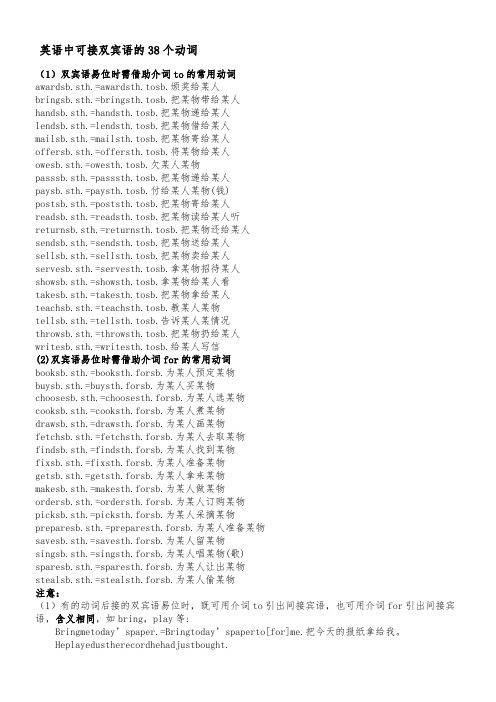
英语中可接双宾语的38个动词(1)双宾语易位时需借助介词to的常用动词awardsb.sth.=awardsth.tosb.颁奖给某人bringsb.sth.=bringsth.tosb.把某物带给某人handsb.sth.=handsth.tosb.把某物递给某人lendsb.sth.=lendsth.tosb.把某物借给某人mailsb.sth.=mailsth.tosb.把某物寄给某人offersb.sth.=offersth.tosb.将某物给某人owesb.sth.=owesth.tosb.欠某人某物passsb.sth.=passsth.tosb.把某物递给某人(2)picksb.sth.=picksth.forsb.为某人采摘某物preparesb.sth.=preparesth.forsb.为某人准备某物savesb.sth.=savesth.forsb.为某人留某物singsb.sth.=singsth.forsb.为某人唱某物(歌)sparesb.sth.=sparesth.forsb.为某人让出某物stealsb.sth.=stealsth.forsb.为某人偷某物注意:(1)有的动词后接的双宾语易位时,既可用介词to引出间接宾语,也可用介词for引出间接宾语,含义相同,如bring,play等:Bringmetoday’spaper.=Bringtoday’spaperto[for]me.把今天的报纸拿给我。
Heplayedustherecordhehadjustbought.=Heplayedtherecordhehadjustboughtfor[to]us.他放了他刚买的唱片给我们听。
(2)有的动词后接的双宾语易位时,即可用介词to引出间接宾语,也可用介词for引出间接宾语,含义不同,如leave等:Theyleftmenofood.=Theyleftnofoodforme.他们没给我留一点食物。
动词后面既能接to_do又能接doing

有的动词后面既能接to do又能接doing,但是意义不太一样有的动词后面既能接to do又能接doing6sa 4级被浏览243次检举有的动词后面既能接to do又能接doing,但是意义不太一样有总结好的吗jasmine_010采纳率:57% 3级类型一:习惯上要接不定式作宾语的动词下列动词习惯上可接不定式作宾语,但不能接动名词作宾语:afford 付得起agree 同意apply 申请arrange 安排,ask 要求care 想要choose 选择decide 决定demand 要求desire 请求determine 决心expect 期待help 帮助hope 希望intend 打算manage 设法offer 主动提出plan 计划prepare 准备pretend 假装promise 答应refuse 拒绝want 想要wish 希望请看以下典型用例:She walked up to the desk and asked to see the manager. 她走到办公桌前要求见经理。
If you would care to leave your name,we’ll get in touch as soon as possible. 请留下您的名字,我们将尽快与您联系。
He applied to be transferred. 他申请调动工作。
There have been fewer problems for travelers who chose to fly. 对于选择乘飞机旅游的人来说问题更少。
$After much discussion they decided to accept our offer. 经过反复讨论,他们决定接受我们开的价。
If I fail to appear by 7 o’clock,I will not be coming at all. 如果我七点钟不到,我就不会来了。
- 1、下载文档前请自行甄别文档内容的完整性,平台不提供额外的编辑、内容补充、找答案等附加服务。
- 2、"仅部分预览"的文档,不可在线预览部分如存在完整性等问题,可反馈申请退款(可完整预览的文档不适用该条件!)。
- 3、如文档侵犯您的权益,请联系客服反馈,我们会尽快为您处理(人工客服工作时间:9:00-18:30)。
习惯上只接动名词作宾语的动词
【常用动词归纳】
admit 承认 advise 建议
allow 允许 appreciate 感激
avoid 避免 consider 考虑
delay 推迟 deny 否认
discuss 讨论 dislike 不喜欢
enjoy 喜爱 escape 逃脱
excuse 原谅 fancy 设想
finish 完成 forbid 禁止
forgive 原谅 give up 放弃
imagine 想像 keep 保持
mention 提及 mind 介意
miss 没赶上 pardon 原谅
permit 允许 practise 练习
prevent 阻止 prohibit 禁止
put off 推迟 report 报告
risk 冒险stop 停止
suggest 建议 understand 理解
【典型用法实例】
I advise waiting a few more days. 我建议再等几天。
They avoided mentioning that name. 他们避免提到那个名字。
He denied having been there. 他否认到过那里。
He disliked being laughed at. 他不喜欢别人笑他。
I’ve enjoyed seeing you and talking about old times.我见到你一起谈往事非常高兴。
We don’t allow (permit) smoking on this plane.在这架飞机上我们不允许抽烟。
I admit breaking the window. 我承认窗子是我打破的。
Try to imagine being on the moon. 设法想像你是在月球上。
He made a New Year’s resolution to giv e up smoking. 他下了新年决心要戒烟。
They risked losing everything. 他们冒失去一切的危险。
He tried to escape being punished. 他设法逃避惩罚。
You shouldn’t keep thinking about it.你不应老想着这事。
Would you mind going with her? 你可否同她一起去?
I can’t understand neglecting children like that.对孩子那样毫不经心,我不能理解。
We only missed seeing each other by five minutes. 我们只因差五分钟而未能见面。
I suggest doing it in a different way. 我建议以另一种方法做这事。
I put off writing from day to day. 我日复一日地推迟写它。
【几点用法说明】
(1)有的动词后接动名词作宾语时通常带有逻辑主语:
The rain prevented his coming. 下雨使他不能来。
Excuse my opening your letter by mistake. 原谅我不慎把你的信拆开。
(2)有的动词(如advise, allow, forbid, permit等)后虽然不能直接跟不定式作宾语,但可接不定式作宾语补足语:
He advised buying a computer. 他建议买台电脑。
He advised her to buy a computer. 他建议她买台电脑。
(3)有些动词(如consider, understand, discuss等)虽不接不定式作宾语,却可接“疑问词+不定式”作宾语:
Have you considered how to get there? 你是否考虑过如何到那儿去?
She doesn’t understand how to look after him.她不知道应如何照顾他。
We discussed what to do and where we should go. 我们讨论了该怎么办及到哪里去。
